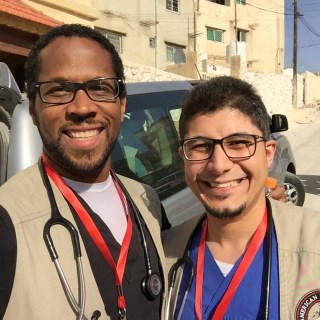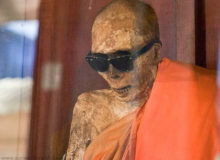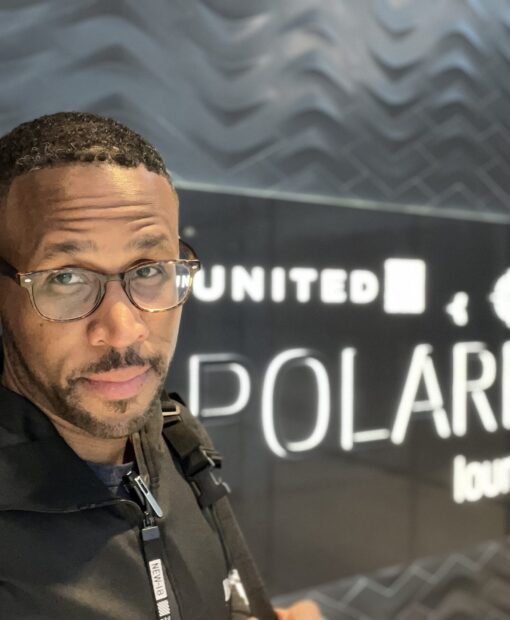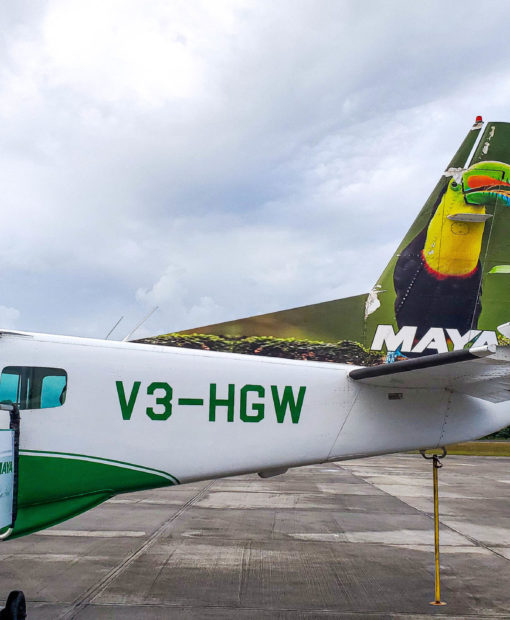Dr. Idries and Dr. Jamil recently went to Jordan on a medical mission with the Syrian American Medical Society (SAMS) to work with displaced Syrian refugees. This is Dr. Idries’ account of his first day on the Jordan medical mission.
The first official day of my Jordanian medical mission was spent in the city of Irbid. With a population of over one million, Irbid is the second largest city in Jordan (after Amman). Located only 12 miles from the Syrian boarder, Irbid has one of Jordan’s largest refugee populations numbering more than 136,000 at last count. As the Syrian crisis continues to develop, more than 1,000,000 refugees have crossed the boarder into Jordan, a country that itself only has a population of about 6,000,000. While the Jordanian government initially provided medical and financial support to refugees, as the refugee numbers continued to swell the government could no longer sustain the burden financially. Ultimately the Jordanian government stopped providing refugees with financial and medical assistance while also making it illegal for them to find employment (in a bid to reduce the already high level of native Jordanian unemployment, about 20%). To make matters worse, refugees living outside of the organized refugee camps cannot receive foreign governmental nor NGO aid. The ultimate result is a situation in which refugees living outside of refugee camps have little or no resources to provide for their daily needs much less to seek even the most basic of medical services. This guaranteed that our first day in Irbid would indeed be a busy one.
The total team for this mission consisted of 65 medical professionals including primary care and specialty physicians, nurses, dentists, pharmacists, acupuncturists and photo journalists. Each day we were split between 8 different locations and my first day was spent at a clinic in Irbid. The Irbid medical team for the day included myself, a dentist from Manchester in the UK, an ER physician from Tacoma, Washington, an Internist from Los Angeles, California and a Pediatrician from Houston, Texas. The 75-minute ride from our hotel in central Amman to Irbid was dominated by sometimes heated discussions about what lead to the Syrian crisis, who was ultimately responsible, what the relationship was between the Assad government and the rise of ISIS in Syria (and elsewhere) and the political reasoning behind the virtual silence and inaction of the US, the EU and the most of the western world when it comes to the Syrian conflict. With such lively discussion, we reached Irbid in no time.

The medication room at our hotel. We jammed as many meds as we could into our bags before leaving every morning.
As our bright yellow bus pulled up to the front of the clinic, we were greeted by a courtyard full of anxious patients who had come to see “the doctors from America”. Shukrum (Thank You) and Ahlan (Welcome) was heard repeatedly as we slowly moved through the crowd and into the clinic building. The facilities could best be described as spartan and the small room that doubled as the pharmacy for the day was stocked only with the medications that we packed into our bags the night before. After quickly stocking and organizing the makeshift pharmacy, we each we went to our designated exam room for the day, this is where I met Shara. Shara was a the third year medical student that volunteered to serve as my Arabic interpreter. Shara told me that her family is from the central Syrian city of Homs and that she and her family had been living in Irbid for the past four years. She was a tall thin young woman with a baby face though her hazel-green eyes definitely provided a glimpse into a life hard lived. The silent story that her eyes told became louder as I asked her how, why and when she and her family fled from Syria, at this moment her eyes began to fill with tears. “Never mind” I said as I quickly changed the subject and decided to discuss what our game plan would be for the day. After all, we had 35 patients to see in the span of six hours so we quickly called in our first patient.
As more and more people came to the clinic, our scheduled 6 ½ hour day quickly became an eight-hour day sans lunch. Even without lunch or a break, the time flew by. As I interviewed and examined patient after patient Shara and I tried our best to address both their physical and emotional needs. Everyone on the face of this planet has a story to tell but these stories were easily among the most heartbreaking that I have ever heard. Listening to their stories, I began to feel like our biggest contribution was providing an understanding ear to listen to and validate their feelings, experiences, fears and hopes. If there was a single take away lesson, it was that the Syrian people feel hopeless, they feel helpless and they feel lost. Most glaringly however, they feel forgotten by the world, swept under the rug and discarded. It is my sincere hope that our presence there let them know that not everyone has turned their backs on them and that the world has not completely forgotten.
To be honest, many of the patient’s stories started to blend together but there are certain stories that will likely always remain with me. I’m certain that I will never forget the young woman from Aleppo who recounted to us with a huge smile how she had always dreamed of having children since she was a child. She recounted summer days spent playing with baby dolls in her family’s garden under the rays of the Syrian sun. The smile slowly faded from her face as she told us about her discovery that she was pregnant two weeks ago. When faced with the decision of either realizing her dream of motherhood or the reality of protecting her child from harm, she choose to take four tablets of Misprostol purchased on the black market. Misprostol is a medication that induces abortion and her reason for coming this day was not to start OB care but rather to ensure that she was no longer pregnant. As I performed an ultrasound on her empty womb, she tearfully thanked Shara and I as she simultaneously asked God to bless us and forgive her. “I just couldn’t bring a baby into this life, into this uncertainty” she said in Arabic. There was little that either of us could do in that moment other than to validate her grief and sorrow and to offer a prayer that in the future things will improve for her and the people of Syria.
80 patients later, the day came to end for our team in Irbid. Emotionally and physically exhausted we all climbed back into our yellow bus as a few of the lingering patients bade us “Salaam” (Peace). Tired as we all were I don’t think a single one of us slept on the ride back to Amman, our minds were racing and our emotions churning. There was no discussion of politics, no discussion of who was responsible for what. There was just quiet reflection on the enormity of the situation and the feeling that nothing we could ever do would be enough. We were just tiny pebbles trying our best but still only making a barely perceptible ripple in a vast ocean of despair. Day #1 was down, Irbid was done and it was now time to rest and prepare for what day #2 would bring.

 June 16, 2017
June 16, 2017












 May 19, 2018
May 19, 2018 





